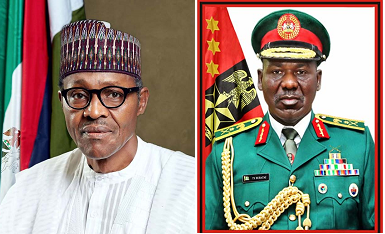 |
 |

Is Buhari Failing on Boko Haram Promise?
Nigeria's president Mohammadu Buhari was largely elected early this year on his strongman image, his persona as an anti-corruption crusader and tough military background. Many Nigerians had hoped he would solve the Boko Haram terrorism problem with quick military dispatch. He, in fact, directed the military, on inauguration, to end the menace by December and moved the tactical command headquarters to Maiduguri, North Eastern Nigeria which has been the hotbed of the Islamic terrorism. Buhari also promised to effect the release of the Chibok school girls abducted by the terrorists almost two years ago.
These promises played well to have him elected in the wake of many Nigerians' perception of ex-President Jonathan as weak on security and anti-corruption. Buhari has now been in office for more than six months and his December deadline to end Boko Haram terror is here and many are beginning to wonder if it was just talk? Did Buhari actually believe the terrorists could be defeated in a few months? Why has the spate of bombings not abated since he took office? As a matter of fact many Nigerians believe the incidents of attacks have become more widespread since Buhari took office, even Nigeria's capital territory of Abuja has not been spared by the group which bombed a motor park and a market in the territory few months into Buhari's administration.
Just recently, the group carried out several bombings in Northern Nigeria killing hundreds of people in the often unexpected occurrences perpetrated by suicide bombers. This is despite the Nigerian military's claims that the government is making progress in combating the terror group.
In September, the Director of Army Public Relations, Col. Sani Usman, said the offensive operations of the government forces had “decimated” the command and leadership of the terror group. The military then claimed that the counter offensive weakened Boko Haram and that the objective of ending the terrorist activities of the group in a short time was feasible. The spokesman was quoted in the media as saying that: “I have no iota of doubt in my mind that our troops will wipe out the insurgents in the shortest possible time and we are committed to this target.”
Just after the initial success of the Nigerian military in recovering some of the North Eastern Villages occupied by the terror group, a new spate of suicide bombings by the group began. In a number of cases the bombs are strapped on hapless young women or girls and detonated remotely, according to reports.
The terror incidents this year have only added to Boko Haram's record as one the world's deadliest terror groups. This November, the international non-partisan Institute for Economics and Peace released it's latest Global Terrorism Index, GTI, in which Boko Haram was ranked above ISIS as the world's deadliest terror group. According to the report, “Deaths attributed to Boko Haram increased by 317 per cent in 2014 to 6,644. ISIL was responsible for 6,073 terrorist deaths.” Thus, while ISIS or ISIL, is portrayed as the deadliest group in the Western media especially in the wake of attacks in Europe, Nigeria has been groaning under the burden of Boko Haram which has become deadlier each year since 2009 when it first caught international attention.
The Index also ranks Nigeria as the third highest country impacted by terrorism, next only to Iraq and Afghanistan and followed closely by Pakistan and Syria. These rankings may change by the end of this year with recent international attacks by ISIS and other threats uncovered in Europe but it does not diminish the impact of the relentless effort by Boko Haram to kill innocent people in Nigeria.
The group still holds captive over 200 Chibok school girls it abducted in April 2014 and has continued to terrorize villages and cities across the North Eastern parts of Nigeria.
Also reports indicate that the Nigerian military may be outgunned by the group which possesses enormous firepower coupled with the element of subterfuge; sometimes hiding among the population. Just recently unconfirmed reports indicated that hundreds of government soldiers were ambushed and massacred by Boko Haram near Maiduguri even as government claims it is winning the war. In late November, the Army suffered a setback in an encounter with Boko Haram in Gudumbali, Borno State where contradictory reports put the military's losses in numbers above one hundred soldiers. The Army denied early reports of the casualty but later admitted it suffered some setback which initially cut some of its soldiers off from the main unit.
Whether Buhari ultimately succeeds in stopping the group is a matter of conjecture but some government insiders in Nigeria believe the President might have underestimated the group's capability when he gave the December deadline while others think he was just playing to the political gallery of the moment.
What is clear, however, is that Buhari's December deadline to stop the menace is unrealistic and the danger that the group grows stronger remains.
@Nigeria Media in Diaspora